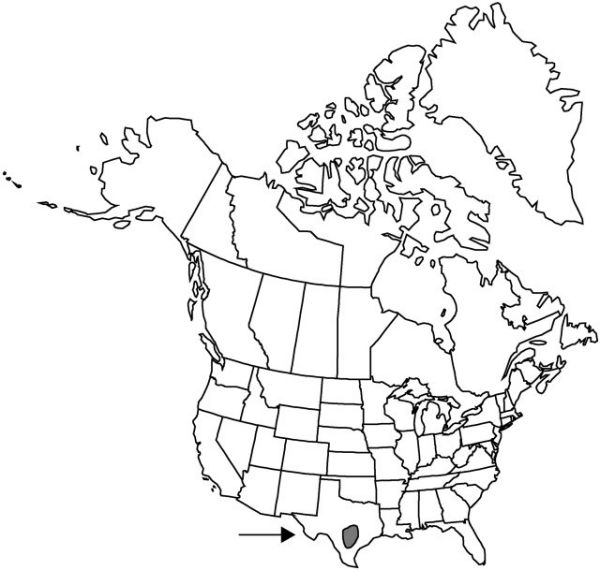Yucca rupicola
Linnaea 23: 143. 1850.
Plants usually forming open colonies of rosettes, acaulescent, with branching subterranean caudices; rosettes 2–15 per colony, each rosette with fewer than 100 leaves. Leaf-blade lanceolate, twisted, strongly concave, widest at middle, distinctly narrowing toward base, broadened at stem attachments, 35–60 × 1.7–4 cm, somewhat fleshy, flexible, margins denticulate or wavy, dark orange or reddish-brown, apex pointed. Inflorescences paniculate, arising beyond rosettes, narrowly ovoid, 2.5–10 dm; branches 0.7–2 dm; bracts erect; peduncle scapelike, 0.3–1.5 m, 1.5–2 cm diam. Flowers pendent; perianth campanulate; tepals distinct, white or greenish white, ovate, 4–7 × 1.5–3 cm, apex sharply acuminate; filaments 1.8–3.2 cm; pistil 2.5–4.5 cm; style white or greenish, 12–20 mm; stigmas lobed. Fruits erect, capsular, dehiscent, ellipsoid to cylindric, 4–5.5 × 2–3 cm, dehiscence septicidal. Seeds dull black, thin, 6–8 mm diam.
Phenology: Flowering late spring.
Habitat: Rocky hillsides of limestone ledges, open plains, woodlands
Elevation: 400–900 m
Distribution

Tex.
Discussion
Yucca rupicola is endemic to southeastern Edwards Plateau. It is the only species in the flora with flaccid, twisted leaves.
Selected References
None.
Lower Taxa
"thick" is not a number. "thin" is not a number."dm" is not declared as a valid unit of measurement for this property."dm" is not declared as a valid unit of measurement for this property. "dm" is not declared as a valid unit of measurement for this property."thin" is not a number.